1222 Read online
Page 5
iv
‘We’ve taken pictures from every angle and every side as best we could in the storm,’ said Geir Rugholmen, groaning beneath the weight of what until recently had been Cato Hammer, a priest at Ris church in Oslo, born in Trondheim, raised in Kristiansand, and with an inexplicable connection to the Brann sports club.
The woman with the quiet voice who had spoken at the information meeting was looking around as if she didn’t know what to do. I remembered that somebody had introduced her as the director. She herself preferred a less pretentious title.
‘Berit Tverre,’ she said seriously. ‘I’m the manager of Finse 1222.’
Her hand was ice-cold, her skin chapped and rough. She was wearing blue knee breeches, khaki socks with a woven pattern, and a thick, beige woollen jumper. Her hair was blonde and caught up in a ponytail, and her eyes were as blue as those on a poster girl for Nazi Germany. A healthy, beautiful hotel manager aged about thirty-five.
‘I was the one who found him,’ she said, clasping her hands in front of her mouth and blowing on them. ‘Bloody hell, it was cold holding that camera. I hope the pictures turn out OK.’
She held out a digital camera to me as if I had suddenly been elected to lead the investigation, without any indication of agreement on my part. I didn’t take it. Berit Tverre hesitated, then put the camera down on a large industrial oven. I hoped it was a while since it had been switched on.
‘I don’t really know if the kitchen is the most suitable place to keep a corpse,’ I said. ‘But I don’t suppose environmental health will be paying us a visit in this weather.’
Geir tipped the body onto an island in the middle of the room. The island was made up of a gas hob, a large sink and an old-fashioned oven with an iron grate. Each part was a different height from the rest. Berit had placed a lid over the sink. Above the whole thing hung a fan, a rectangle several metres long made of frosted glass with aluminium fittings. For a moment it made me think of a coffin, which might descend on the corpse at any moment.
Cato Hammer definitely looked uncomfortable lying there. His eyes were wide open. His mouth was gaping, his tongue pressed against his palate. The entry wound went through the left cheek immediately below the eye, and you didn’t need years of experience as a police officer to see that the shot must have been fired at close quarters. I would even hazard a guess that the barrel of the gun had touched the skin. A bluish circle was visible around the hole. As soon as Geir hauled the corpse inside, I had noticed that the exit wound was large. I felt no compulsion to look at it more closely.
‘Shouldn’t we,’ Geir began breathlessly, ‘shouldn’t we take his temperature? To find out how long he’s been dead?’
‘If you feel like sticking a meat thermometer in his liver, carry on.’ I brushed the dead man’s face gently with my hand and went on: ‘You could try with the brain. Or some internal organ. Personally, I wouldn’t bother. We won’t learn much from a measurement without precise instruments.’
‘But what about you? I mean, you said ...’
‘Once upon a time I was a tactical investigator,’ I said. ‘As a lawyer you ought to know that’s something completely different from what the crime scene technicians do on CSI.’
‘I work in property development,’ said Geir. ‘As a police officer you ought to know that’s something completely different from criminal law. And I don’t waste time watching television programmes. What do we do now?’
I slowly wheeled my chair around the corpse. There wasn’t much room, and I got stuck for a while by the windows. It looked as if Cato Hammer might have broken his arm. Without touching it, I leaned forward. There was something about the angle of the lower arm. The palm of the hand looked unnatural, lying there with the thumb in the wrong place.
‘I’m afraid that’s my fault,’ said Geir. ‘As far as I know, nothing was broken when I picked him up. I – I dropped him on the floor out there. I’m sorry. As I said, we have got photos of him as he really looked. What do we do now?’
Both the entry and exit wounds showed that Cato Hammer had been shot with a heavy-calibre weapon. A revolver, in my estimation.
‘They make a loud noise,’ I said.
‘What?’
‘Where did you actually find him?’
‘Two or three metres from the door,’ said Berit Tverre. ‘And it was a close thing.’
‘What was?’
‘Well, he was practically buried in the snow. I could see his hands and a bit of his left leg. I only went out to put up a new thermometer.’
‘Remember that.’
‘What?’
‘Remember how much of the body was visible,’ I said, without taking my eyes off the dead man.
In spite of the fact that the corpse looked terrified, on closer inspection there was something trusting about his expression. It looked as if he had been enormously surprised at first, and had then happily decided that the surprise was a positive one. Perhaps he had caught sight of his God in time, and realized that things weren’t so bad after all.
‘What in the world could he have been doing out there?’ asked Geir. ‘Outside? In this weather? Or do you think he was shot first and then dragged outside afterwards by —’
‘That,’ I broke in, ‘is probably a key question. If we find out what Cato Hammer was doing outside in a snowstorm in the middle of the night, we’ve got the murderer on a plate. Unfortunately, it’s not that easy to get any answers out of poor Cato here.’
‘I mean, he is pretty well used to the mountains,’ said Berit, looking at the corpse with an expression that suggested melancholy rather than grief. ‘He ought to know better than to go outside now. In this weather. I don’t understand it. He knows ... he knew the mountains.’
‘How do you know that?’ I asked.
‘He’s been here before. To the hotel, I mean. Several times. Most of those who say they know the mountains are lying. But he ...’
I thought I could see the hint of a blush on her face. On the other hand, she did have rosy cheeks anyway.
‘He was also pretty cautious by nature,’ said Geir, looking sceptically at the dead man.
‘Did you know him as well?’
‘Well, I don’t know if I’d go that far. I’m on the board at Brann. Which means it’s more or less impossible to avoid bumping into this idiot.’
‘But ... cautious? What do you mean by that?’
Geir shrugged his shoulders.
‘He kept his guard up. Tried to be nice to everybody, kind of. A bit ... polished around the edges. Wanted to please everybody. That sort of thing.’
He wrinkled his nose and adjusted the snuff.
‘I had the opposite impression,’ I said. ‘I mean, he must be regarded as controversial, surely?’
Geir didn’t reply.
‘Have you got one of those dolls they use to teach CPR?’ I asked.
‘A what?’
‘One of those ... It’s called Resusci Annie, or something like that, isn’t it? The doll you use to learn mouth-to-mouth resuscitation?’
‘No,’ said Berit Tverre sceptically.
‘It’s a bit too late to try mouth-to-mouth on Hammer.’
Geir laughed. Under the circumstances, the shrill, girlish laughter made him seem even more unsure of himself.
‘Some other kind of doll, then,’ I said. ‘Life-sized. Have you got anything like that? If not, maybe you could make one. Out of blankets and a cabbage, for example.’
‘And why would we want to do that?’
It really is amazing how slow people can be. Even educated people who are familiar with the mountains. I looked at Berit Tverre, waiting for the penny to drop.
‘Oh,’ she said eventually. ‘We put the doll in the snow in the same spot, and see how long it takes for it to get covered in snow to the same extent.’
‘That would at least give us some kind of indication of the time of the murder,’ I said, nodding. ‘If the weather remains as bad, more or less. And it wo
uld be a useful thing to do. For those who will end up investigating this eventually. Which will be incredibly straight-forward, of course.’
I had seen more than enough. So had Cato Hammer, I expect. I ran my hand over the staring, dead eyes. The body had already begun to thaw, and it was easy to close his eyelids.
My chair was halfway across the floor before Geir pulled himself together.
‘What shall we do with the body?’
‘Put him in the freezer,’ I suggested. ‘Or put him outside again. Find a sheltered spot and cover him up with a tarpaulin or something along those lines. Use your imagination. There ought to be enough cold places up here. Where’s the train driver?’
Without waiting for an answer I moved off and added:
‘Let the dead take care of the dead.’
‘Hang on a minute!’
I stopped, and even managed not to sigh.
‘What are we going to do?’ Geir persisted. ‘There’s a murderer out there, and as far as I know you’re the only one with any kind of police experience, and —’
‘Listen to me,’ I said, turning my chair around. It isn’t completely impossible for me to be nice if I want to be. ‘This so-called Royal Carriage,’ I said, drawing quotation marks in the air. ‘As far as I understand it, the passengers from that carriage have been installed in the top apartment in the wing. I have no idea who was on board. But at any rate, I certainly don’t believe they were royals. Our royal family simply doesn’t behave that way. But as the platform was actually cordoned off in Oslo, and as the whole thing is surrounded by such enormous secrecy, then I have to conclude that there must be police officers among them. Security guards, perhaps, if not from the palace. And since this is definitely a case for the police, it would be an excellent idea to seek them out and explain the situation.’
There was of course an ulterior motive to my sudden attack of volubility. I was looking directly into Geir’s eyes as I was talking. Once again I saw that faint flicker I couldn’t quite interpret. He licked the corner of his mouth as if he wanted to divert attention from the fact that he was blinking too often.
‘I think you both know who’s up there,’ I said with a smile.
Neither of them said anything, but nor did they exchange glances. Berit Tverre was looking downwards at an angle, and I was unable to see what she was studying so carefully. In the silence between us I realized I was afraid of the hurricane for the first time since I woke up on the floor in the reception area after having been rescued from the train. The gusts of wind were so strong that we could hear the clink of glass and the rattle of tins. At brief, irregular intervals we heard loud thuds and bangs against the outside walls, as if the weather gods were beginning to believe that it might at last be possible to tear down this building, after all those stormy mountain winters.
‘I think you know,’ I repeated, moving towards the door leading into the lobby. ‘But that’s none of my business, of course. None of this is, fortunately. But I’m still —’
A violent gust of wind against the wall brought me to an abrupt halt.
‘I’m still going to give you a piece of advice,’ I went on when the unexpected surge of fear had abated. ‘Fetch one of the doctors. There are plenty of them around. Not because they can be of any help to Cato Hammer, but because it would be a good idea to conduct a preliminary examination. When it comes to the actual murder, that can wait. There’s no point in starting an investigation here and now. Wait for better weather. Wait for the police. Let them do what they can, and this will all be cleared up in no time.’
I had reached the door; I pushed it open and rolled out of the room.
Nobody made any attempt to call me back.
v
I couldn’t sleep, of course.
I had moved over to the long table, and I didn’t really know if it was because I wanted to get closer to Adrian, or further away from the kitchen. Geir and Berit had emerged and walked past me without a word. I had no idea what they had done with the corpse out in the kitchen. With the roar of the storm it was impossible to say whether they had bundled Cato Hammer into the walk-in freezer or whether he was still lying on the metal worktop; the thought reminded me that I was hungry.
Adrian was still curled up on the window ledge with his back to the storm. The blanket had partly slipped off. I was close enough to pick up the smell of badly dried clothes and sweaty feet, but far enough away for him not to notice when I turned my chair to look at him more closely. He was completely motionless.
Once upon a time I had been able to sleep like that too.
The boy looked good. As he lay there now, not screwing his mouth up in that practised, dismissive expression, I could see that his lips were full. Even though they were dry with flakes of loose skin and a sore right across the centre of his lower lip, the half-open mouth gave away how young he was. His teeth were white and even, his tongue pink and happy, like a puppy’s tongue. A little spot by the side of his nose was the only defect on his beardless face: you could call it a beauty spot. I was tempted into pushing the cap up from his eyebrows. I didn’t complete the movement. He sat up with a jolt, a protective hand held in front of his face.
‘It’s only me,’ I said quietly. ‘Wouldn’t you rather lie down on the sofa over there?’
‘Shit,’ he mumbled. ‘I was dreaming.’
I hadn’t seen the sweater he was wearing before. It was a bit too small, even for a skinny boy like him. He was still wearing his own thick hoodie underneath the sweater; it was sticking out at the neck and wrists, as if he were caught in a cocoon and were trying to escape.
‘You shouldn’t go to sleep in clothes that are too tight.’
‘I’m cold,’ he said, yawning.
‘Try it the other way round. Put the sweater inside with the hoodie on top.’
‘It’s too bloody scratchy.’
‘Would you rather be itchy or cold?’
He didn’t reply, and pulled a face as he turned his head.
‘You can borrow my padded jacket to put over you,’ I said, pointing over towards the sofa by the bar.
I wouldn’t get any more sleep tonight.
‘Veronica lent me this,’ he said, looking down at his chest. ‘She knitted it herself.’
‘So her name’s Veronica, then.’
He grinned and looked up.
‘Look at this ...’
He lifted the sweater slightly. Just above the lower part at the front, Vålerenga’s logo had been knitted into the pattern, roughly and with letters that could be made out only with difficulty. Adrian laughed, a dry, unfamiliar laugh.
‘It’s a bit stupid having the logo so low down, really.’
‘Not very Nemi, being interested in football,’ I said. ‘Shouldn’t you try to get a bit more sleep?’
Instead of replying he stretched and put his feet on the floor. He gave an enormous yawn. His breath was musty and smelled of stale alcohol.
‘Who’s been giving you drink?’
‘Somebody.’
‘The somebody who gave you the sweater?’
‘Mind your own fucking business.’
I moved away.
‘Anyway, it’s not fair,’ I heard Adrian mumbling. ‘Some people were allowed to bring their luggage from the train. I wasn’t. Were you?’
‘I was unconscious,’ I said, struggling to get a drink of hot chocolate out of the machine in the bar. ‘So the answer is no.’
‘My iPod’s still there. And my clothes. I haven’t even got a tooth-brush.’
‘You can buy one down in the kiosk.’
The machine must be switched off. There were no lights showing. I was manoeuvring my chair behind the counter to look for the plug when a thought struck me.
‘You were awake during the rescue operation,’ I stated casually. ‘Did you notice whether most people managed to bring their stuff with them?’
‘Noooo ...’
Adrian considered the question.
‘That wom
an with the pink kid was yelling because she got it into her head they weren’t going to take the buggy. And then there was some idiot who wanted to take a massive great trunk with him. They wouldn’t let him. I didn’t really think about my own bag. At the time. I just wanted to get away from ...’
‘Were you brought out early?’
‘Early?’
‘Yes, were you among the first to arrive at the hotel?’
I’d given up on the chocolate machine, and was looking at Adrian. He flushed red.
‘I’m fifteen years old, for fuck’s sake. I keep on hearing that I’m just a kid, only a kid.’ He put on a voice that was presumably meant to represent a middle-aged, female childcare expert. ‘In which case it’s only right that I was among the first to be rescued!’
‘That’s absolutely true. But that means you were here when people started to arrive. Do you remember anything else about that business with the luggage?’
Adrian stood up and came over to me. With quick, sure movements he examined the front and back of the machine before getting down on all fours, fishing out a plug and inserting it in a socket that I couldn’t see.
‘It ought to work now,’ he said. ‘Can you reach?’
‘Yes. Thank you.’
‘There wasn’t actually all that much luggage,’ he said thoughtfully. ‘Now you come to ask. People just came pouring in, all cold and bad-tempered. But there were a few of those arseholes, those business types in suits and so on who had their laptops with them. They clung to their computers like that woman from our carriage clung to her kid. And then there was an old woman with a knitting bag. At least, that’s what she said it was. And then there were loads of girls with ordinary handbags. And then of course Veronica had her black bag. And then —’
‘Can you write this down for me, Adrian?’
‘You what?’
‘Could you possibly be very kind and write down everything you can remember about the luggage? Who had what?’
‘Write it down! I can’t see a computer around here. Can you?’
‘By hand, Adrian. You can write things down by hand, can’t you?’
He was suddenly preoccupied with getting a cup of hot chocolate from the machine.

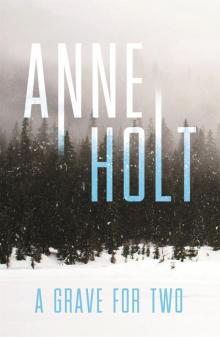 A Grave for Two
A Grave for Two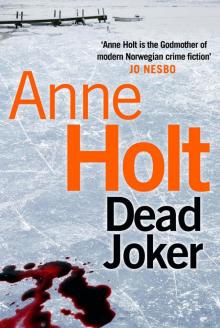 Dead Joker
Dead Joker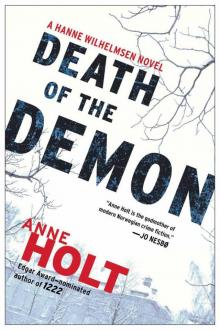 Death of the Demon: A Hanne Wilhelmsen Novel
Death of the Demon: A Hanne Wilhelmsen Novel Punishment aka What Is Mine
Punishment aka What Is Mine Beyond the Truth
Beyond the Truth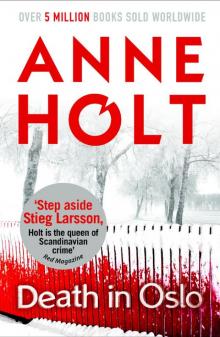 Death in Oslo
Death in Oslo The Blind Goddess
The Blind Goddess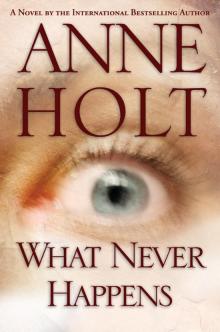 What Never Happens
What Never Happens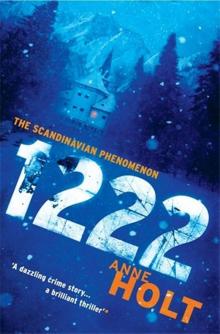 1222
1222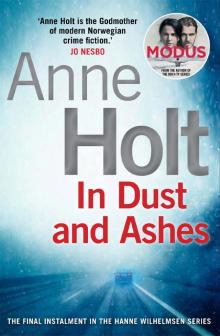 In Dust and Ashes
In Dust and Ashes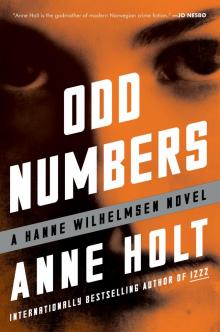 Odd Numbers
Odd Numbers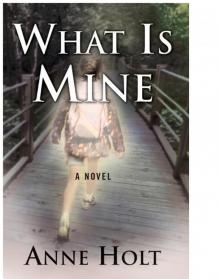 What is Mine
What is Mine What Dark Clouds Hide
What Dark Clouds Hide Blessed Are Those Who Thirst
Blessed Are Those Who Thirst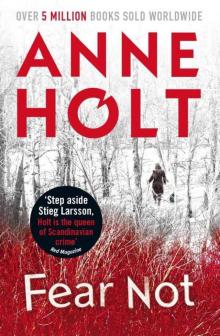 Fear Not
Fear Not No Echo
No Echo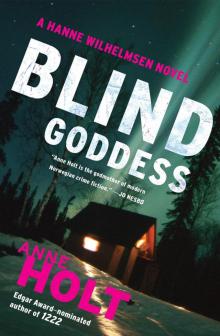 Hanne Wilhelmsen - 01 - The Blind Goddess
Hanne Wilhelmsen - 01 - The Blind Goddess